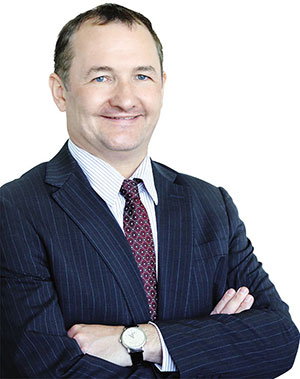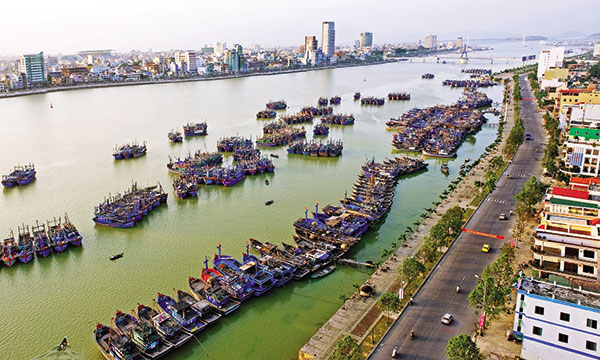Central Vietnam has emerged as the third-most attractive investment destination for both domestic and foreign investors after Vietnam’s two hubs of Hanoi and Ho Chi Minh City – with the offer of a host of investment incentives for the central region as proof. VIR’s Hoang Anh spoke with Warrick Cleine, chairman and CEO of KPMG in Vietnam and Cambodia, about Central Vietnam’s potential to attract investment and the firm’s co-operation with its partners to promote investing in the region.
 |
Drawing on your experience as an observer of investment movement, can you tell us what has attracted investment to the central region?
Central Vietnam is undergoing an aggressive process of industrialisation, modernisation, and global integration. With the government’s recent efforts to improve the investment climate, business environment, and policy mechanisms to increase dynamic efficiency, I believe Central Vietnam will soon be a focal point for investments.
With its strategic location, Quang Nam province and Central Vietnam play a critical role connecting the north and south of Vietnam. It also acts as an important gateway to the Pacific Ocean, supporting trading activities between Vietnam and Laos, northeast Thailand, Myanmar and other countries in the Greater Mekong Sub-region, and the Indian Ganges River economic areas.
Aside from its geographical proximity, investors come to the area to take advantage of the labour force in the region. Not only are labour costs low, but the overall population in the region is young, dynamic, diligent, and well-educated, and could easily be trained to master new technologies and processes.
Central Vietnam has a number of different zones in which investors can establish a manufacturing presence [industrial zones and economic zones]. Firms investing in these zones typically enjoy preferential governmental policies and advantages, like modern infrastructure and greater access to utility services, on top of preferential tax and/or tariff rates.
The Vietnamese government is now offering the most favourable incentives in terms of land use and taxes to draw investors to the central region. Do you think such incentives will prove enough to attract more investors, or will something else be needed to enable investors to quickly make decisions?
In general, not only will attractive investment incentives be taken into consideration, but investors are also concerned with the enhancements of investment processes and administrative policies. The government recently put a lot of effort into strengthening the investment environment, improving disciplines, fighting back against corruption, and resolving recent environmental issues.
In addition, Central Vietnam also needs to help investors save time and unofficial expenses by enhancing a more co-operative mechanism on administrative procedures for registering conditional projects of enterprises.
Well-developed infrastructure is also key to attracting investors. While there are already a number of international airports, deep-water seaports, and road and railway networks in the region, the standards are not yet up to international levels. Improving infrastructure and facilitating connectivity and continuous flows of cargo and passengers will be one of the key focus areas to give the region a higher status among investors.
Investing in people is also important as we will need to enhance labour standards to meet international best practices, as well as reforms around labour standards.

Concentrating on the adoption of best practices and blessed with convenient regional positioning, Central Vietnam is emerging as the country’s next big opportunity
At present, heavy industries such as oil refineries, petrochemical, power, and non-smoke-emitting industries such as tourism are fast-developing in central cities and provinces. As an investment advisor, what do you think must be addressed so as to enable these industries to develop in line with the region’s sustainable growth strategy?
The activities of certain industries, such as hydropower plants and forestry, are essentially incompatible. Throughout 2016, we have seen the Vietnamese government broadening dialogues with businesses in an effort to reconcile the differences between different industries.
Nevertheless, laws and policies generally provide a legal framework only. But much more than a framework for businesses to resolve the problem is required. Indeed, when conflicts arise, the parties involved will need to come together to negotiate and be open to certain modifications to their businesses. This mutual commitment will help both parties accept win-win solutions.
With more large-scale projects set up in central provinces such as Quang Nam and Quang Ngai, will KPMG make a strategic move to expand its network in the region?
Gauging its potential, many international investors have already poured money into Central Vietnam. It enables professional service providers like KPMG to widen their client base. In late 2015, we opened a representative office in Danang to give businesses operating in the area easier access to the international-standard audit, tax, and consulting services we provide.
KPMG is now working with some organisations to promote the central region. Could you shed some light on this?
Complexity is a constant in today’s business environment. It’s inherent in the evolving changes in public policies and regulations, the continuing virtualisation of business processes, and even in the potential opportunities major business transactions may offer. Technology and other market forces are disrupting business models, blurring the lines between industries, and requiring an entirely new way of thinking and developing relevant business strategies.
“Going for Gold” is the theme of our co-activities to promote investment in Central Vietnam. Together with our strategic partners in the region, including organisations such as the Investment Promotion Agency, the Vietnam Chamber of Commerce and Industry, and EuroCham, we will facilitate the mutual sharing of best practices, expertise, and knowledge of both parties in providing support and services to investors as well as in promoting the destination.
We will work shoulder-to-shoulder with these organisations, our clients, and our business partners, and engage them in networking events, conferences, workshops, and seminars. We will provide investors with insights and data regarding the market, legal regulations, financial policies, investment procedures, partners, and potential for socio-economic development and investment opportunities in Central Vietnam.
KPMG professionals serve as trusted advisors to many of the leading organisations both in Vietnam and around the globe. We know our insights and guidance will help investors to better understand market dynamics and address the root causes of the complex challenges affecting their business decisions.
by VIR